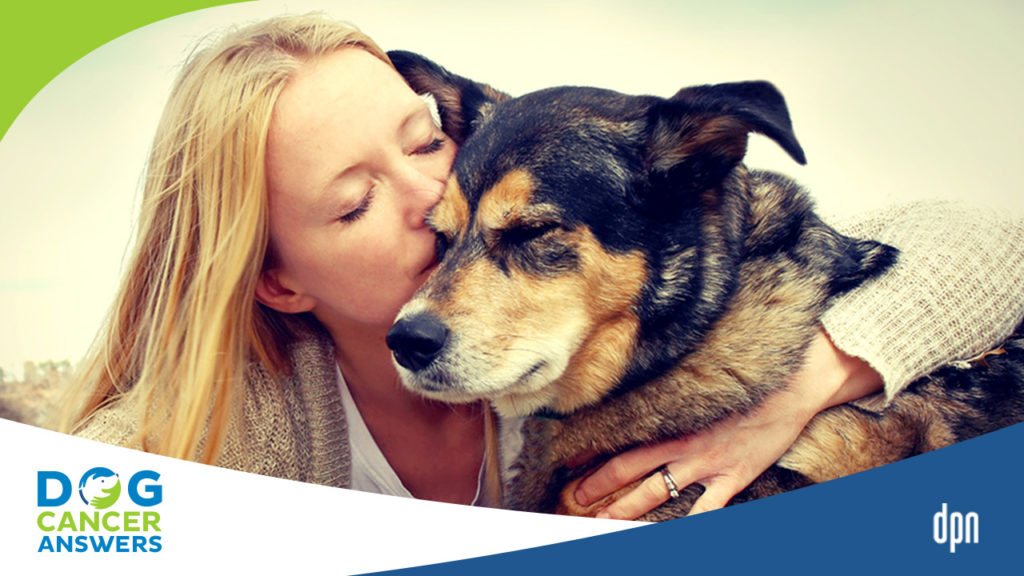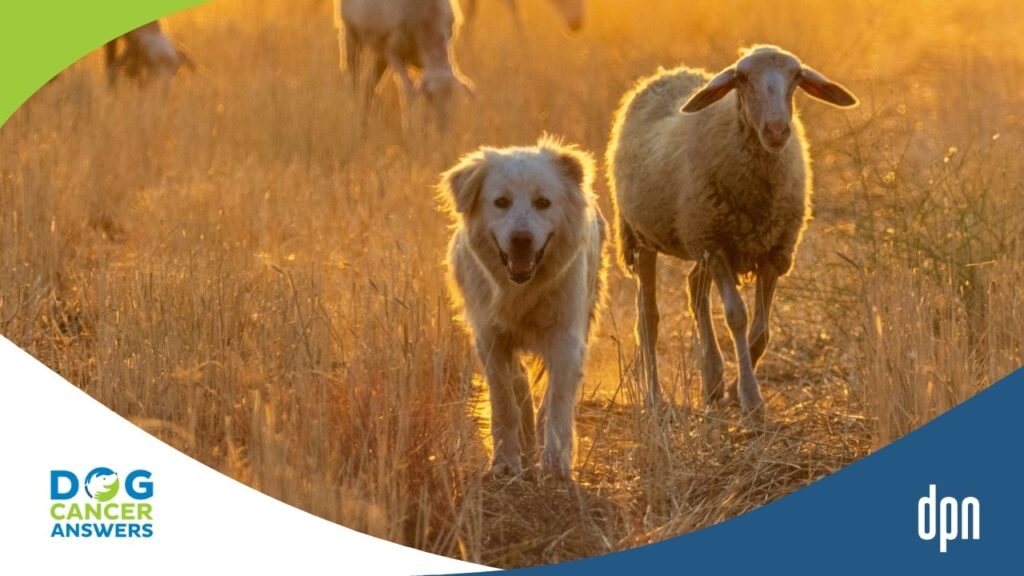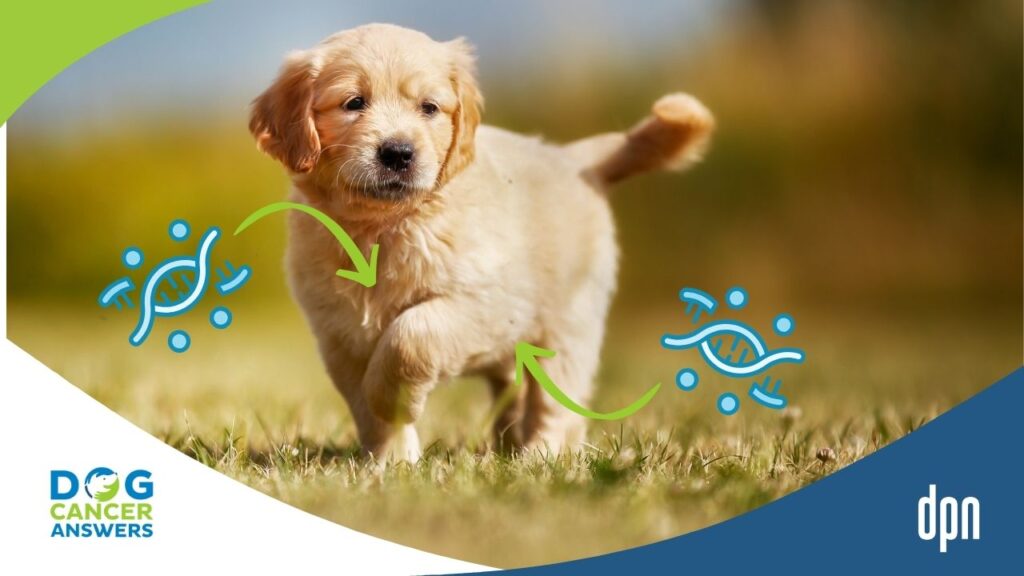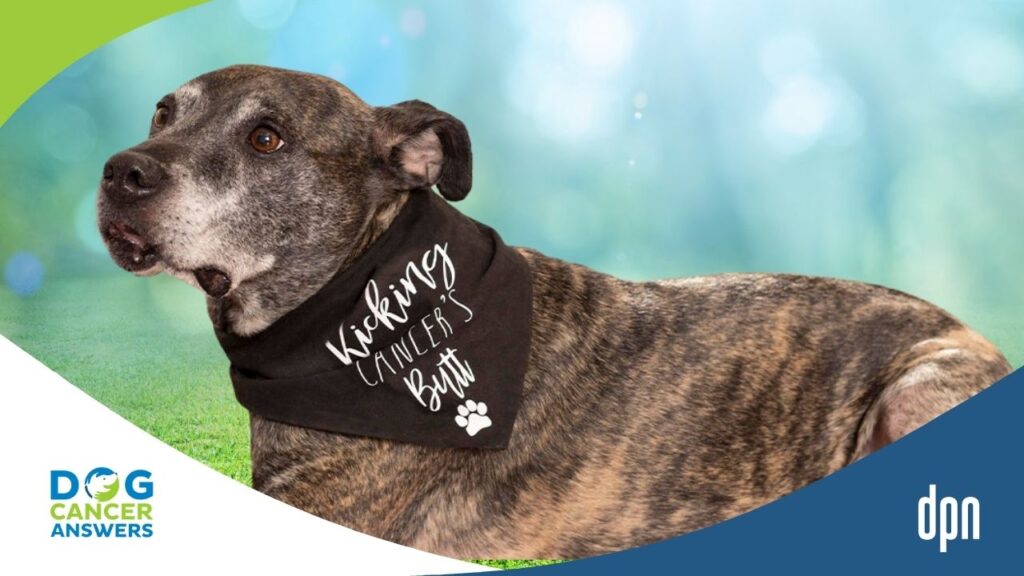[00:00:00] >> James Jacobson: Our sponsor today is the most helpful book for anyone dealing with dog cancer: The Dog Cancer Survival Guide written by doctors Demien Dressler and co-author Dr. Susan Ettinger, also known as Dr. Sue Cancer Vet. Together they outline the full spectrum approach to dog cancer. It includes everything that has been shown to help your dog fight cancer, even strategies usually thought of as outside the box. That’s the Dog Cancer Survival Guide.
[00:00:32] >> Molly Jacobson: This is an adaptive challenge, right? Like there’s no straight road that you can take and type B’s by nature have that kind of questioning idea, they actually are able to tolerate being in the middle and balancing much better than the other types sometimes.
So that skill set is something you should lean on, and remind yourself that when you start to feel dark and like, I’m really failing ’cause I can’t find a good way forward, that that’s not you. That’s cancer.
[00:01:01] >> Announcer: Welcome to Dog Cancer Answers, where we help you help your dog with cancer. Here’s your host, James Jacobson.
[00:01:09] >> James Jacobson: Hello friend. Thanks for joining us today. You are joining this episode of Dog Cancer Answers if you’re a Type B and you want to figure out the best way to approach your dog cancer journey. And if you’re like, "What’s a Type B?" Well, then I want to refer you over to the episode that we did one or two back called What Type of Personality Are You and where we lay out the A, B, and C.
So we will assume that you’ve already heard that and you’re joining us right now because you know you’re a Type B. To talk about Type B is Molly Jacobson, editor of the Dog Cancer Survival Guide. Molly thanks for being with us.
[00:01:48] >> Molly Jacobson: Thank you for having me.
[00:01:50] >> James Jacobson: So I know I’m a Type B because I’ve already done the quiz, I’ve already figured it out, I’ve already listened to that episode. What kinds of treatments am I as a Type B, someone who’s focused on balance, most likely to pursue?
[00:02:05] >> Molly Jacobson: Well you are most likely to pursue the treatments that you know for sure will get you a decent longevity and have a low risk of side effects. Now, sometimes you’re going to do something that might have a higher risk of side effects, like surgery, for example, would be one that almost always, you know, there’s healing time and it can be hard to get over.
But you’re going to chance it cause that’s really still the best way to treat dog cancer.
[00:02:31] >> James Jacobson: And as you said in the previous episode, surgery is almost universally seen as the best, most effective thing that you should start with when your dog has cancer, ’cause cutting it out is removing cancer from the body.
[00:02:43] >> Molly Jacobson: Yep, absolutely.
There’s nothing as effective at this point. It is the standard of care. If you can do an operation, do a surgery, get it out. So you might be willing to tolerate more side effects from surgery than say radiation. Right? For Type B everything depends.
[00:03:02] >> James Jacobson: It all depends.
[00:03:02] >> Molly Jacobson: It all depends. How old is my dog? Does my dog have any other health issues that we have to take into account?
What’s the personality of my dog? A Type B might look at the dog cancer diet in the book and say, well, that’s really nice. That’s, that’s great that those are the best foods for cancer dogs. But my dog would never eat it.
[00:03:22] >> James Jacobson: Or, there’s no way I’m going to spend hours getting all the ingredients and cooking them.
[00:03:28] >> Molly Jacobson: And I’m not going to spend all those ingredients and cook them when I could be doing something else, right? Or, you know what I’m doing over here, it’s always going to be B for balance, right? So always balancing all of the things. So, everything I would say is on the table, but they’re looking for leverage a lot of times, like they’re looking for real leverage.
[00:03:49] >> James Jacobson: So going back to the question, what are the types that you most commonly see people pursuing?
You said it could be surgery. What else are Type B’s likely to do?
[00:03:59] >> Molly Jacobson: Well in full spectrum cancer care, right, we’ve got five steps. First step is conventional treatments like surgery, radiation, or chemo. Second is nutraceuticals like Apocaps, Neoplasene, and artemisinin. Third are anti metastatic supplements and immune boosting supplements.
Those would be like medicinal mushrooms. Krill and fish oil are really good in the next step, which is diet, but there’s modified citrus pectin in step three. There’s a bunch of things in there that you can do. And then step four is diet, getting that low carb, relatively high fat diet on board, home cooked if you can.
And then step five is lifestyle adjustments, all sorts of things from getting more exercise, fresh air, stimulating the mind with training, to things like, you know, getting a Reiki session or acupuncture. So all of those things would be on the table for our Type B for balance, but where an A would be like, I’m doing one of each, a Type B is going to look for what’s the thing that’s going to give me the biggest bang for the buck and cost the least. So they’re going to probably be a little bit more likely to back away from conventional treatments that have a high risk of side effects and go more towards supplements that typically don’t have any side effects. And I would say they usually are very interested in dietary changes because it feels like that’s a really low risk activity with a high payoff of good nutrition and fighting cancer. And they of course like lifestyle stuff, but they’re always going to be able to consider all five steps.
It’s just really balancing, like, what’s going to really improve my dog’s life quality.
[00:05:45] >> James Jacobson: Is there anything that a Type B would not do?
[00:05:49] >> Molly Jacobson: I don’t think so. A Type B is someone who, um, I think of the CHOP protocol, just because it’s the longest one-
[00:05:56] >> James Jacobson: CHOP is…?
[00:05:57] >> Molly Jacobson: It’s a chemotherapy protocol for lymphoma, and it consists of four drugs, and C H O P as, it’s an acronym.
Right. So it’s 19 weeks long. Right? And so the dog goes in every week for 19 weeks. A Type A person might look at that and say, okay, 19 weeks of chemo, if we see side effects, we adjust doses, but we keep going. A Type B person might say, well, 19 weeks, if he does okay, that’s fine. But if I see side effects start up, I don’t want to continue, or I want to skip that agent for the rest of the rounds. Like they would be more likely to modify the CHOP protocol. They would be more likely to cut it short, maybe not finish the whole thing. So it’s not that they wouldn’t do chemo. It’s that they might decide, we’ll give it a try and then we’ll see how it goes, which is actually a very valid way to approach cancer, right? Like try it, see how it goes.
[00:06:58] >> James Jacobson: So if you’re a Type B and you are working with an oncologist on a chemo treatment plan, a Type B is more likely to sort of guide the hand of the oncologist?.
[00:07:11] >> Molly Jacobson: Um, I don’t know about guide the hand, but they will probably be asking a lot more questions about things like side effect, comfort care at home, what kinds of home care am I doing, what else do I need to know? A Type B is often someone who goes, what’s the fine print. Let me, let me read the details here, like what else can I expect? What are you not telling me?
[00:07:32] >> James Jacobson: A little more skeptical, and whereas a Type A is just going to go with what the oncologist is pretty much recommending, this is the best thing that we should do, a Type B is going to be more inquisitive?
[00:07:43] >> Molly Jacobson: I think so. You know, I think we’re probably going to talk about the other two types a lot in Type B, because it’s sort of like bridging those two. So a Type C might be like, no chemo, there’s going to be side effects, don’t want to deal with that, forget it. A Type A is going to be like, sure, there might be side effects, we’ll see, and then we’ll deal with them as they arise. And a Type B is more like, there might be side effects. When would those appear? How will I know that they’re happening? What do we do if they show up, what can you do to mitigate those?
I, can you lower the dose to begin with so he never has to experience side effects at all? They’re going to ask all of those questions right up front just by nature of their own personality of like really wanting, not just to understand the protocol, but also to understand the impact on the dog and how they can really preserve life quality.
They don’t want to give up longevity, though they will give it up if it impacts life quality.
[00:08:42] >> James Jacobson: So if you are a Type B and you do find yourself asking all these questions to the veterinary team, it’s okay. In fact, there’s a whole bunch of resources that we have on Dog Cancer Blog and episodes that we’ve done on Dog Cancer Answers in terms of how to work best with the vet team, to make sure that you as a B personality are getting the answers that you need to sort of moderate this action versus comfort to create balance.
[00:09:12] >> Molly Jacobson: I think there’re like 150 questions in the chapter in the book called Working With Your Veterinarian. I think Dr. Dressler literally listed out 150 questions that you could potentially ask your veterinarian. So you will definitely want to take a look at that.
[00:09:28] >> James Jacobson: So this is really good for Type B .
[00:09:29] >> Molly Jacobson: Yeah, it’s a Type B chapter.
[00:09:31] >> James Jacobson: What situations really drive a Type B, a balanced guardian, crazy?
[00:09:38] >> Molly Jacobson: Most cancers require you to choose the least worst option, right?
[00:09:43] >> James Jacobson: The least worst option.
[00:09:44] >> Molly Jacobson: Right, like it’s awful. It’s overwhelming. And there’s never a good, like clean, simple solution. Very rarely, right? So for a Type B what’s really going to drive them crazy is when the life quality is suffering and they’re not getting the longevity. That’s kind of like a last straw situation, and that’s when they’ll turn and really, I think start to beat themselves. I think type B’s are often, because they’re always balancing and they’re always looking for like, how am I doing? They’re constantly assessing, and they’re maybe a little bit more prone to introspection and maybe self-blame than other personality types.
So I think when things start to feel like, I’m not getting the results of longevity that I want, and my dog is suffering, they can really go to a, kind of a dark place where they say I’m really failing my dog.
[00:10:38] >> James Jacobson: Do you have any coping tips specifically for Type B folks?
[00:10:42] >> Molly Jacobson: Yeah. One of the main things is to remember that cancer is terrible, sneaky, disgusting, horrible, nasty.
It changes, it figures things out, it sneaks around. It finds ways to circumvent everything you’re doing. And that ultimately this is an adaptive challenge, right? Like there’s no straight road that you can take and Type B’s by nature have that kind of questioning idea. They actually are able to tolerate being in the middle and, and balancing much better than the other types sometimes.
So that skill set is something you should lean on and remind yourself that when you start to feel dark, and like I’m really failing ’cause I can’t find a good way forward, that that’s not you. That’s cancer. It’s not your fault. It’s cancer’s fault. Cancer is at fault.
[00:11:41] >> James Jacobson: That’s really good advice. So if you’ve listened to all this and you’re like, yes, I’m a Type B, this is helpful, I totally get it, there’s a lot more information and resources for you in our Facebook group at Dog Cancer Support, which you can find online by just typing in DogCancerSupport.com and it’ll redirect you to our Facebook group. We also have a newsletter that comes out three times a week, and you can subscribe to that at DogCancerNews.com.
However, if after listening to Molly talk about Type B personality you’re like maybe I’m a bit more Type C, or maybe I’m an A, I don’t know. Well, we have those episodes in this series. So find that episode of Dog Cancer Answers and give it a listen. Molly Jacobson, thanks for being with us today.
[00:12:29] >> Molly Jacobson: Thanks for having me.
[00:12:30] >> James Jacobson: Most of all thank you for listening. I’m James Jacobson. On behalf of all of us here at Dog Podcast Network I want to thank you for listening, and I want to wish you and your dog a very warm Aloha.
[00:12:43] >> Announcer: Thank you for listening to Dog Cancer Answers. If you’d like to connect, please visit our website at DogCancerAnswers.com or call our Listener Line at (808) 868-3200. And here’s a friendly reminder that you probably already know: this podcast is provided for informational and educational purposes only.
It’s not meant to take the place of the advice you receive from your dog’s veterinarian. Only veterinarians who examine your dog can give you veterinary advice or diagnose your dog’s medical condition. Your reliance on the information you hear on this podcast is solely at your own risk. If your dog has a specific health problem, contact your veterinarian.
Also, please keep in mind that veterinary information can change rapidly. Therefore, some information may be out of date. Dog Cancer Answers is a presentation of Maui Media in association with Dog Podcast Network.








